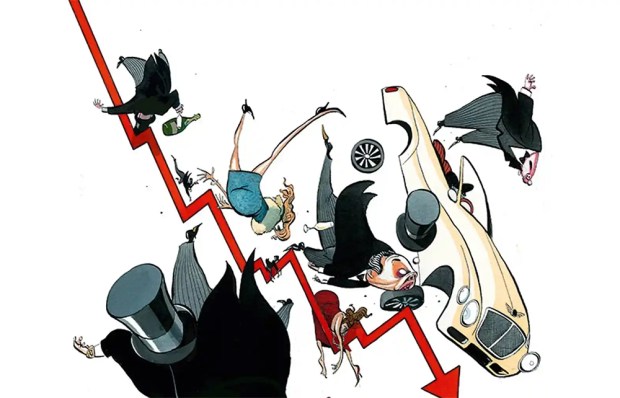The FTSE100 index stands precisely where it did in the first week of December 1999. Whichever way you look at it, shareholders — including pension funds — have had a rotten run on the economic rollercoaster of the past 15 years. So it’s reasonable to keep asking whether the rise in executive pay over that same period is justified: a report from the High Pay Centre says remuneration of the average FTSE100 chief executive is now at a multiple of 130 times (corrected from the report’s original figure of 143 times) that of the average worker in the same companies. In 1998 that multiple was 47, indicating that top pay has almost tripled relative to workforce earnings while shareholder returns have stayed flat.
Of course this argument is not that simple. There was undoubtedly a time, before the Thatcher revolution, when British company chiefs were miserably under-rewarded; what has happened since is a long pendulum swing chasing US-led norms applicable to ‘global’ companies. The make-up of the FTSE100 has also changed to include more firms that are foreign in all but their London listings and corporate offices; some are mining groups whose workers in Africa and elsewhere are paid very little, distorting the multiple. And the High Pay Centre, though it calls itself ‘an independent non-party think tank’, is in fact the successor of the ‘High Pay Commission’ launched by the Labour-aligned Compass group; it starts from the position that ‘growing differences in pay between high and low earners are neither fair nor proportionate’ and presents its data accordingly.
But left-wingery aside, the ballooning of executive pay is a startling shift in the balance of rewards between providers of capital and hired managers. No politician ever promoted it as a policy objective; shareholders let it happen by hardly ever voting against it. It is easy to justify only in the very rare case of a veteran business-builder like Sir Martin Sorrell of the advertising group WPP, who clocked up a spectacular personal multiple of 780 last year. Heightened awareness of the issue was indicated when the new TSB Bank (carved out of Lloyds) declared a maximum multiple of 65 for the pay of chief executive Paul Pester; this plus a general promise to cap bonuses contributed to positive sentiment for TSB’s flotation in June. The High Pay Centre argues for ‘a democratically enacted maximum pay ratio of (for example) 75:1’ — knowing well that not even Ed Miliband on a bacon-sandwich day would embrace such a provocatively anti-capitalist idea. But it cannot be a good thing that the multiple should go on growing, unrelated to relative performance, simply because institutional shareholders can’t be bothered to rock the executive boat more often. Let’s have a proper debate about it.
A welcome dip
One swallow does not make a summer, and a 5.9 per cent August drop in the average asking price for London homes doesn’t make a down-trend. But let’s hope that’s what this dip turns out to be, because it’s hard to think of any economic benefit from the recent surge in property values — unless you’re a ‘superboomer’ who sold a suburban house for £2 million and bought a yacht instead. The steep rise fuelled by low interest rates, foreign cash and City bonuses has created social distortions and barriers to enterprise by making parts of the metropolis inaccessible as places to live for people who work or would like to do business there. If we could have a downswing in commuter rail fares as well as house prices, the capital would be a better balanced and more thriving place at every level.
Stamina generation
Here in France, the most popular house-party conversation, after the career prospects of the young which I wrote about last week, is the career prospects of the old. My chums are all either side of their 60th birthdays. A few years ago, we would have been thinking collectively about retiring; now none of us are. The sea captain has requalified for bigger ships. The judge looks forward to ‘another decade at least’ on the bench. The ex-mandarin in the corporate world says he won’t stop until he has bought flats in London for each of his children. One journalist, asked why he turned down a promotion, says, ‘Well, I am 66’; another who could be lazing by the pool spends her day pitching a ‘randy guinea-pig’ story to the red-tops as if her life depends on it. Such stamina, such resilience, such worldliness; who’d offer a job to a callow graduate when you can still have one of us?
No birthday gâteau
One person who reached 60 last week, and on whom even his best friends must surely wish retirement as soon as constitutionally possible, is this column’s summer comedy stooge President François Hollande — now preparing for ‘la rentrée noire’ at the end of August after news of zero second-quarter growth, a fiscal deficit running above 4 per cent of GDP, and a poll of 78,420 Le Figaro readers of whom 95 per cent think him incapable of restarting the stalled French economy. According to another paper, it was ‘60 candles but no gâteau’ as he marked his birthday ‘dans la morosité’.
How ironic that one of Hollande’s first presidential decrees was to reduce the official retirement age back to 60 — against the trend across the developed world — for those who have contributed to the social security system throughout their working lives. That’s one reason why the French have the longest (and thereby most burdensome to the public purse) retirement expectations of all OECD nations: 27.4 years for women and 22.6 years for men. Those numbers compare with 22.1 and 19.1 years respectively in the UK; we sit below 18 EU countries in this particular table — and that’s one reason why we’re well above them in the growth recovery league. My cohort are not only enjoying the extended afternoon of our careers as we enter our seventh decade; we’re doing the nation an economic service.
Got something to add? Join the discussion and comment below.
Get 10 issues for just $10
Subscribe to The Spectator Australia today for the next 10 magazine issues, plus full online access, for just $10.
You might disagree with half of it, but you’ll enjoy reading all of it. Try your first month for free, then just $2 a week for the remainder of your first year.
















Comments
Don't miss out
Join the conversation with other Spectator Australia readers. Subscribe to leave a comment.
SUBSCRIBEAlready a subscriber? Log in